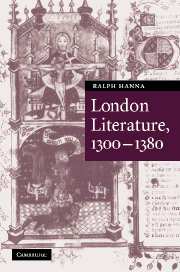Book contents
- Frontmatter
- Contents
- List of abbreviations
- In Thrall
- 1 English vernacular culture in London before 1380: the evidence
- 2 The ‘Old’ Law
- 3 Reading romance in London: The Auchinleck Manuscript and Laud misc. 622
- 4 Pepys 2498: Anglo-Norman audiences and London biblical texts
- 5 Anglo-Norman's imagined end
- 6 ‘Ledeþ hire to Londoun þere lawe is yshewed’: Piers Plowman B, London, 1377
- The end of early London literature
- Bibliography
- Index of manuscripts cited
- General index
- Cambridge Studies in Medieval Literature
6 - ‘Ledeþ hire to Londoun þere lawe is yshewed’: Piers Plowman B, London, 1377
Published online by Cambridge University Press: 22 September 2009
- Frontmatter
- Contents
- List of abbreviations
- In Thrall
- 1 English vernacular culture in London before 1380: the evidence
- 2 The ‘Old’ Law
- 3 Reading romance in London: The Auchinleck Manuscript and Laud misc. 622
- 4 Pepys 2498: Anglo-Norman audiences and London biblical texts
- 5 Anglo-Norman's imagined end
- 6 ‘Ledeþ hire to Londoun þere lawe is yshewed’: Piers Plowman B, London, 1377
- The end of early London literature
- Bibliography
- Index of manuscripts cited
- General index
- Cambridge Studies in Medieval Literature
Summary
Whatever one may feel about the ambivalences of ‘Whan Y woned in Cornhulle’ (C 5.1) or about Langland's attitude to the metropolis, his poem, particularly in its B inflection, is a London work and the culmination of Edwardian literature in the City. Evidence for such a siting appears prominently in the manuscript record, as well as inferentially in specific contemporary references inscribed in the poem and surrounding it.
The immediate evidence for Langlandian publication has long since disappeared, and one must recuperate it from books in the main contemporary with early manuscripts of Chaucerian works. The surviving books represent the end of a tradition; for example, as defined by Russell-Kane, at least four or five intermediary copying generations intrude between the poet's C Version and the extant manuscripts. The B Version is much less problematic, embodying some suggestive evidence that at least two copies are second generation.
Initially, firm placement in London depends upon Doyle-Parkes's identification of the hand responsible for an early C Version copy, University of London Library, MS S.L./V.88 (‘the Ilchester MS’) with their Scribe D, who participated in the Gower of Cambridge, Trinity College, MSR.3.2 (174–82, 206–8, illustrated plate 51 [180]). On the basis of Jeremy Smith's linguistic researches (1983, 1988), which show progressive removal of what may be this scribe's native Worcestershire spelling system, the book probably represents his oldest surviving copying.
- Type
- Chapter
- Information
- London Literature, 1300–1380 , pp. 243 - 304Publisher: Cambridge University PressPrint publication year: 2005

